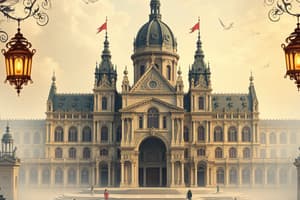Podcast
Questions and Answers
What system of government does India follow?
What system of government does India follow?
- Parliamentary system (correct)
- Federal system
- Presidential system
- Absolute monarchy system
Who acts as the nominal head in a Parliamentary System?
Who acts as the nominal head in a Parliamentary System?
- President (correct)
- Prime Minister
- Speaker of the House
- Chief Justice
Which country is NOT an example of a Parliamentary System of Government?
Which country is NOT an example of a Parliamentary System of Government?
- China (correct)
- United Kingdom
- India
- Japan
What is the highest law-making body in India?
What is the highest law-making body in India?
What is the role of the Prime Minister in a Parliamentary System?
What is the role of the Prime Minister in a Parliamentary System?
How many executives are present in a Parliamentary System?
How many executives are present in a Parliamentary System?
What is the function of the Union Parliament according to the text?
What is the function of the Union Parliament according to the text?
Who designed the Parliament of India according to the text?
Who designed the Parliament of India according to the text?
Which philosopher proposed the idea of a separation of powers?
Which philosopher proposed the idea of a separation of powers?
What form of government does India follow?
What form of government does India follow?
What principle is the parliamentary system based on?
What principle is the parliamentary system based on?
Who is regarded as an integral part of Parliament according to the text?
Who is regarded as an integral part of Parliament according to the text?
Flashcards are hidden until you start studying
Study Notes
Forms of Government
- There are various forms of government present in the world, including absolute monarchy, presidential, parliamentary, and others.
- Examples of parliamentary systems of government include the United Kingdom, Japan, and Germany.
Parliamentary System of Government
- A parliamentary system of government is a form of government where there are two executives as the head: a nominal head and a real head.
- The President acts as a nominal head (de jure head) and the Prime Minister acts as a real head (de facto head) of the government.
- India adopted a parliamentary system of government as per the Constitution of the country at both the union and state levels.
Union Parliament
- The Union Parliament is the highest law-making body in the country.
- It is made up of three components: the President, Lok Sabha (People's House), and Rajya Sabha (upper house).
- The government of India has three spheres: the Union Parliament, the state government, and the local government.
Functions of Union Parliament
- The Union Parliament has various functions, including:
- Law-making
- Approving the budget
- Oversight of the executive
- Representation of the people
- Part V of the Constitution of India deals with the functions of the Union Parliament.
History of the Parliament
- The Parliament of India was designed by British architects Sir E.Lutyens and Sir Herbert Baker in 1912-13, but construction started in 1921 and was completed in 1927.
- The French philosopher Montesquieu introduced the idea of a separation of powers in his book The Spirit of the Law.
Features of Parliament
- The parliamentary system is based on the principle of cooperation and coordination between the legislature and the executive.
- The characteristics of a parliamentary government in India include:
- Presence of nominal and real executives (President and Prime Minister)
- Party system
- Collective responsibility of the executive
- Membership of ministers in the legislature
- The Constitution of India deals with the parliamentary process at the center and in the provinces.
Studying That Suits You
Use AI to generate personalized quizzes and flashcards to suit your learning preferences.




